16 States Pushing 'Don't Say Gay' Bills and Censorship Laws Right Now
03/29/22
trudestress
By continuing to use our site, you agree to our Privacy Policy and Terms of Use.

Florida Gov. Ron DeSantis signed the state's "don't say gay" bill into law Monday, but the Sunshine State isn't alone in these efforts -- it's actually part of a national trend.
Six other states are considering legislation that would ban or restrict classroom (or counseling office) discussion of LGBTQ+ issues and identity or books and other educational materials that have LGBTQ+ content. Meanwhile, several more are seeking to allow parents to censor books they don't want their children seeing, and one has already restricted instruction about "divisive issues" in higher education. These bills aren't surfacing only in rural states or the Deep South -- they've also come up in such reliably blue states as Illinois, New Jersey, and Rhode Island, although they have little chance of passing there.
Here, The Advocate looks at the history of "don't say gay" bills analyzes the current state of these and other censorship attempts -- and the legislators behind them.

"Don't say gay" bills have gotten much publicity this year, but they're really nothing new. Tennessee made a big splash in this area in 2011, when Sen. Stacey Campfield introduced a bill that would ban any lessons related to homosexuality through eighth grade. The bill failed to pass, and Campfield tried again in 2013, adding a provision that would have required teachers and counselors to out students to their parents. That legislation failed too. Campfield is no longer in office, but other Tennessee lawmakers are trying again.
Before there was "don't say gay," there was "no promo homo" -- bills that proliferated in the 1980s and '90s as conservative legislators responded to the AIDS crisis by seeking to ban what they considered "promotion of homosexuality" in schools, especially in sex education courses. These bills became law in states including Alabama, Arizona, Louisiana, Mississippi, North Carolina, Oklahoma, South Carolina, Texas, and Utah. The laws have now been repealed or struck down in all but four states: Louisiana, Mississippi, Oklahoma, and Texas, according to GLSEN.
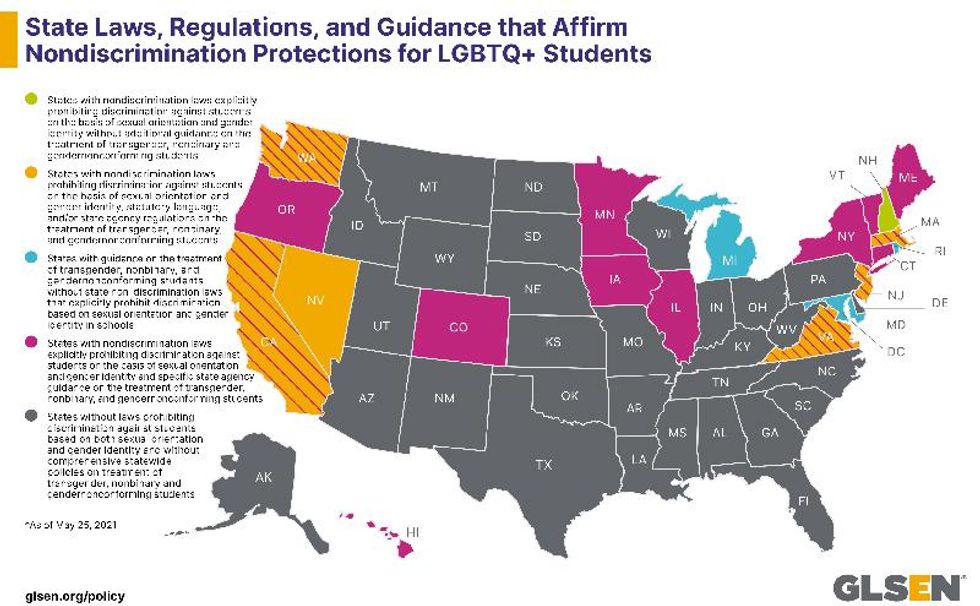
A major difference between "no promo homo" bills and "don't say gay" bills is that the latter often have a "heavy-handed mandate on parent and family involvement," says Melanie Willingham-Jaggers, GLSEN's executive director. For instance, some would allow parents to veto books or other materials they don't want their child exposed to, or require that teachers and counselors divulge certain information to parents that students have shared with them. "These mandates are harmful and risk carelessly outing LGBTQ+ young people to families who do not affirm their children's identities," Willingham-Jaggers says.
Even when "don't say gay" bills don't pass, the anti-LGBTQ+ rhetoric that comes up in the debates over them does harm, points out Cathryn Oakley, state legislative director and senior counsel at the Human Rights Campaign. She also notes that these bills are more accurately described as "don't say gay or trans" bills, as they target transgender people along with everyone else under the LGBTQ+ umbrella. There has been great progress for LGBTQ+ Americans in recent years, and the emergence of restrictive legislation is in large part a backlash to that, she adds. Backers of these bills "are people whose mission is to roll back acceptance of LGBTQ people," she says.

Florida's notorious bill, officially titled Parental Rights in Education, to bans instruction on sexual orientation and gender identity in grades K-3 and requires that it be "age-appropriate" after that -- a vague descriptor that puts LGBTQ+ students and staff at risk of erasure and worse. It has passed both houses of the legislature and has been signed into law by Gov. Ron DeSantis, a Republican with presidential ambitions. Those who support "don't say gay or trans" bills across all states are virtually all Republicans.
The chief sponsor of Florida's bill is Sen. Dennis Baxley, one of the most anti-LGBTQ+ legislators in the state. Among his "greatest hits" are saying that lesbians are dysfunctional as parents, that being transgender is like believing you're an automobile, and that marriage equality is "not good for society." He has also supported so-called conversion therapy and sought to make it a felony to provide gender-affirming care to young people.
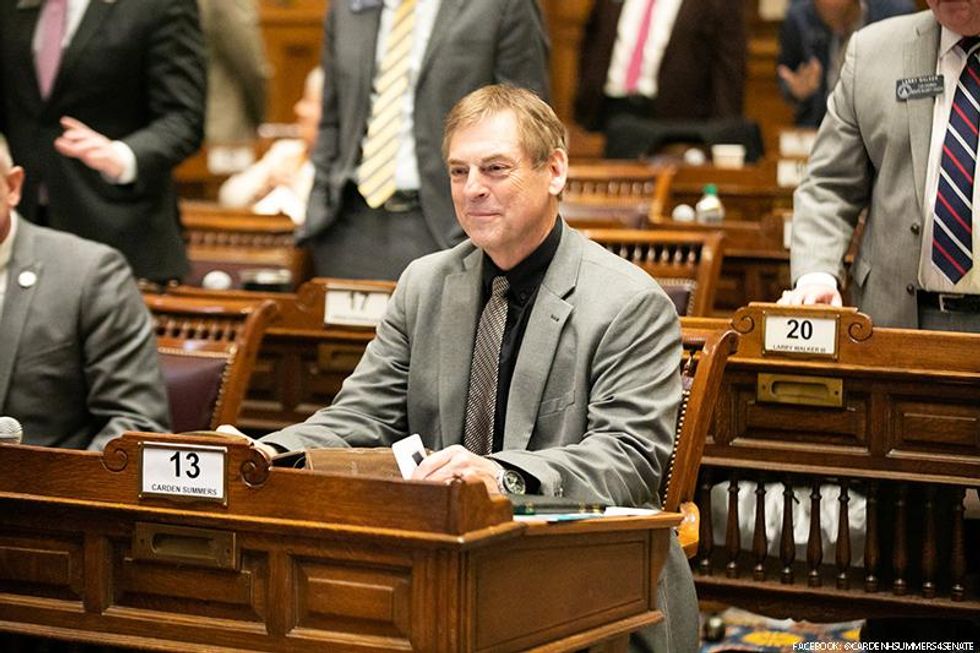
Neighboring Georgia is following Florida's lead with a bill aimed at private schools. Senate Bill 613, introduced March 9 by Sen. Carden Summers, claims that some personnel at private schools "have inappropriately discussed gender identity with children who have not yet reached the age of discretion."
The state has authority to regulate private schools that participate in a special needs scholarship program or in athletic associations with public schools. The bill seeks to ban any lessons that "promote the concept that there is a hierarchy of oppressor and oppressed" when it comes to race, gender, sexual orientation, or gender identity. The section on the latter two reads, "No private or nonpublic school or program to which this chapter applies shall promote, compel, or encourage classroom discussion of sexual orientation or gender identity in primary grade levels or in a manner that is not appropriate for the age and developmental stage of the student."
What the bill, if passed, would likely do is shut down any discussion of LGBTQ+ identity, along with discussions of racism and sexism. Although titled the Common Humanity in Private Education Act, it could have the effect of erasing the experiences of certain humans.
It is late in Georgia's legislative session, so the bill, which has been referred to a Senate committee, is unlikely to pass this year. But "the measure's mere existence means it could be used as grist to energize conservatives on the campaign trail -- and a trial balloon that sets the stage for more serious discussion next year," The Atlanta Journal-Constitution reports.
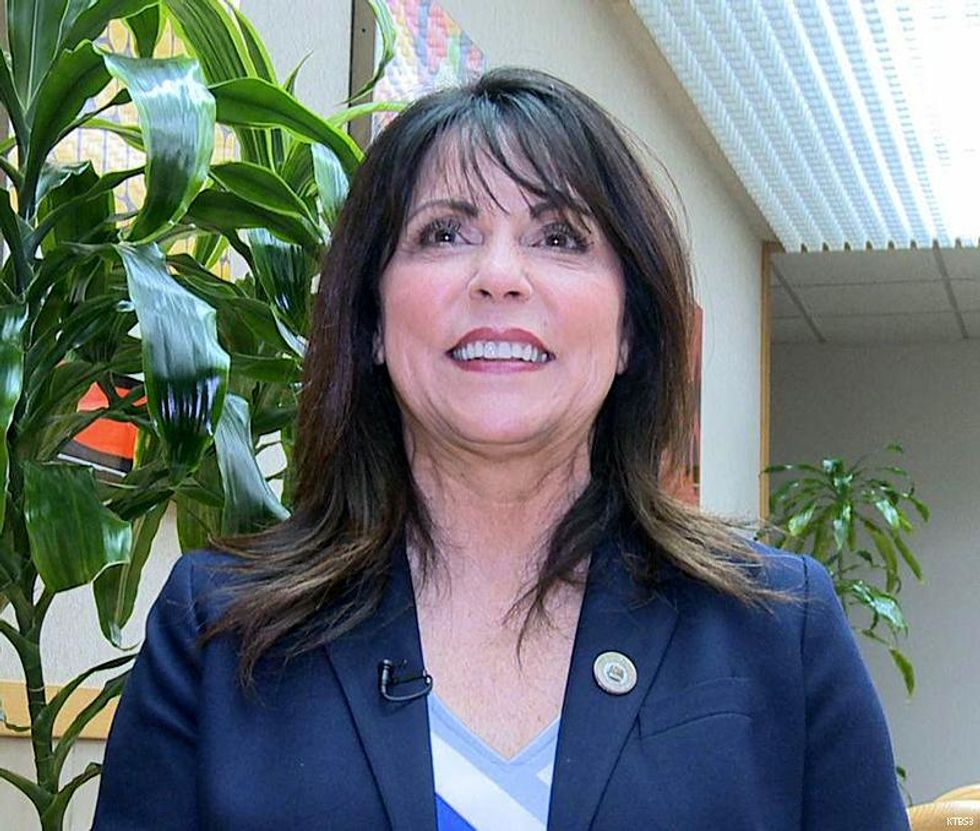
Louisiana's version of a "don't say gay or trans" bill, House Bill 837, is pretty drastic. "No teacher, school employee, or other presenter shall cover the topics of sexual orientation or gender identity in any classroom discussion or instruction in kindergarten through grade eight," it states. "No teacher, school employee, or other presenter shall discuss his own sexual orientation or gender identity with students in kindergarten through grade twelve." The bill was introduced March 17 and referred to a House committee.
"I talked to some educators," its lead sponsor, Rep. Dodie Horton, told Louisiana's Advocate newspaper, no relation to this publication. "They are not equipped nor do they want to deal with these types of issues that belong in the home."
Chris Kaiser, advocacy director for the American Civil Liberties Union's Louisiana affiliate, noted to the paper that the bill "seems to be part of a trend to file a lot of different types of legislation that is just aimed at villainizing gay and transgender people and basically removing them from public life."
Hundreds of students at Ben Franklin High School in New Orleans walked out Friday in protest of the bill.
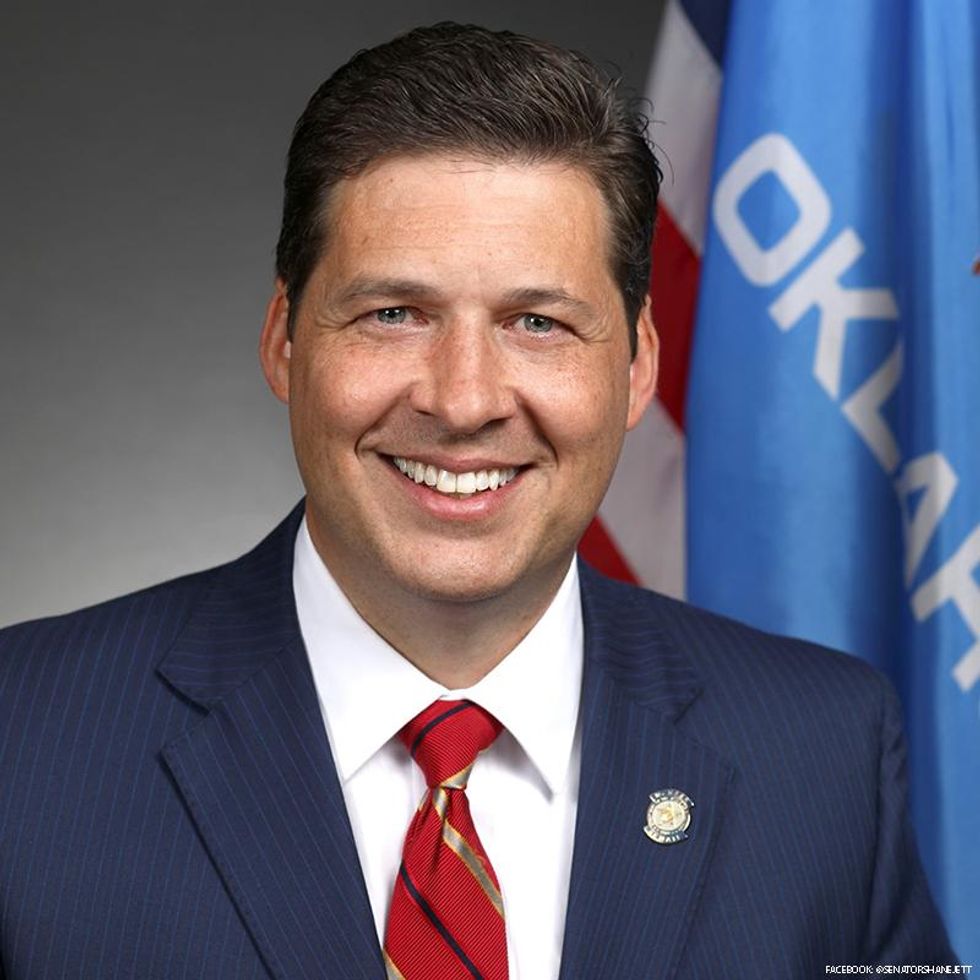
Challenges to LGBTQ-inclusive books in public schools and their libraries are proliferating, and Oklahoma is out to ban these materials statewide. "No public school district, public charter school, or public school library shall maintain in its inventory or promote books that make as their primary subject the study of sex, sexual lifestyles, or sexual activity, or books that are of a controversial nature that a reasonable parent or legal guardian would want to know of or approve of prior to their child being exposed to it," states Senate Bill 1142, which was approved by a Senate committee in early March, advancing to the full Senate. It's not hard to imagine homophobic or transphobic parents not wanting their kids exposed to these "lifestyles."
"More and more schools are trying to indoctrinate students by exposing them to gender, sexual and racial identity curriculums and courses," Sen. Rob Standridge, sponsor of this and some related bills, said in a press release. "My bills will ensure these types of lessons stay at home and out of the classroom."
Sen. Shane Jett's (pictured) Senate Bill 1654, which was introduced in January but hasn't come to any vote, is even worse. "No public school district, public charter school, or public school library shall maintain in its inventory or use in its curriculum books that make as their primary subject the study of lesbian, gay, bisexual, or transgender issues or recreational sexualization," it reads. "For the purposes of this section, 'recreational sexualization' means any form of non-procreative sex."
This is on top of a bill that seeks to classify depictions of oral or anal sex, whether between people or the same sex or opposite, as obscene. That measure, Senate Bill 9, was approved Thursday by the Oklahoma Senate and is going to the House for further consideration.
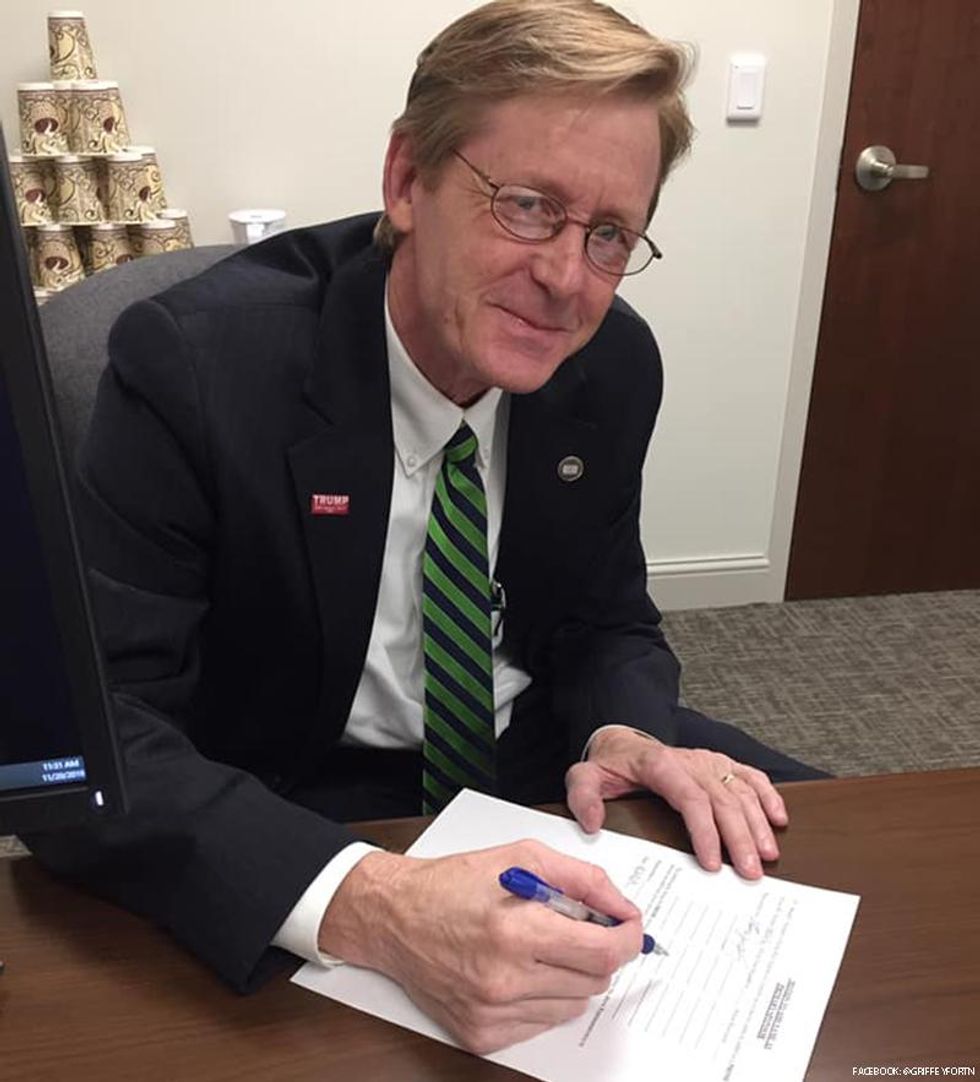
Tennessee was one of the earliest states to consider "don't say gay" legislation, but backers of such measures haven't managed to get them passed. Right-wingers in the state are trying again this year. House Bill 800 would ban the use of "textbooks and instructional materials or supplemental instructional materials that promote, normalize, support, or address lesbian, gay, bisexual, or transgender (LGBT) issues or lifestyles."
"The state of Tennessee is not allowed to teach my daughters Christian values that I think are important and they should learn, so I teach those at home," its sponsor, Rep. Bruce Griffey, recently told a Tennessee TV station. "So if those are not part of the school curriculum, I don't see how LGBTQ and other issues and social lifestyles should be part of the curriculum."
The bill has been referred to a House committee, and a companion bill is pending in the Senate.
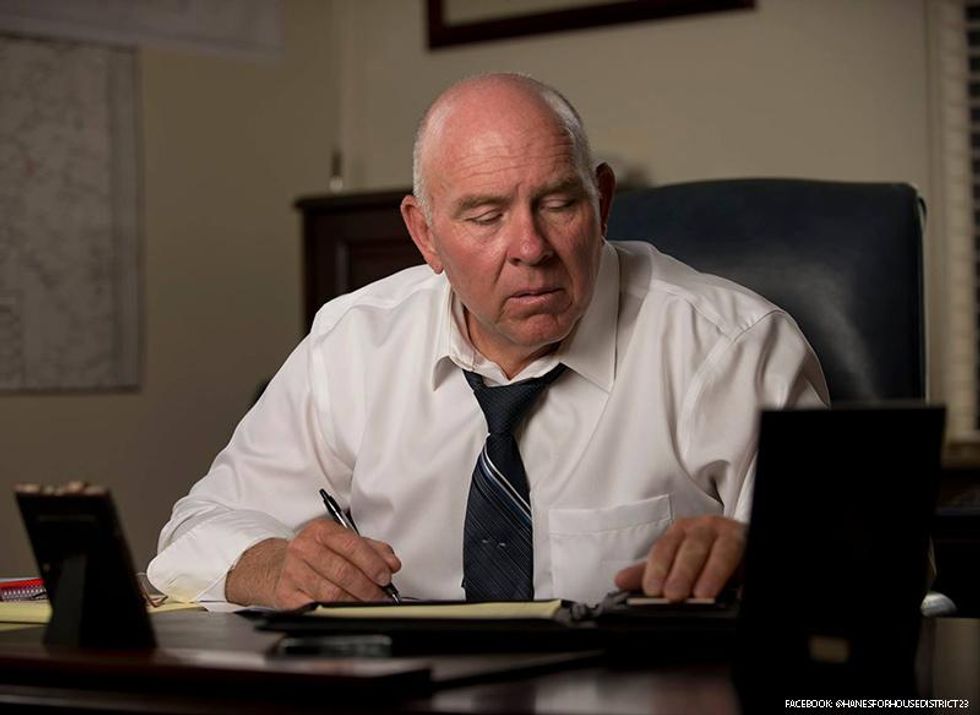
Alabama Rep. Tommy Hanes (pictured) has introduced legislation that would ban the use of the American School Counselor Association standards in public schools. A resolution he submitted to the Alabama Republican Party claimed that the standards seek to "indoctrinate all Alabama public-school students, grades k-12, in a personal/social development program (which includes social engineering -- diversity, equity, same sex marriage, etc) without the knowledge of the parents." The party approved the resolution overwhelmingly, even though the standards have been used in Alabama for 19 years and are respected nationwide. Another Alabama bill, sponsored by Rep. Danny Crawford, would ban the teaching of "divisive concepts based on race or sex" -- in other words, the role of racism or sexism.
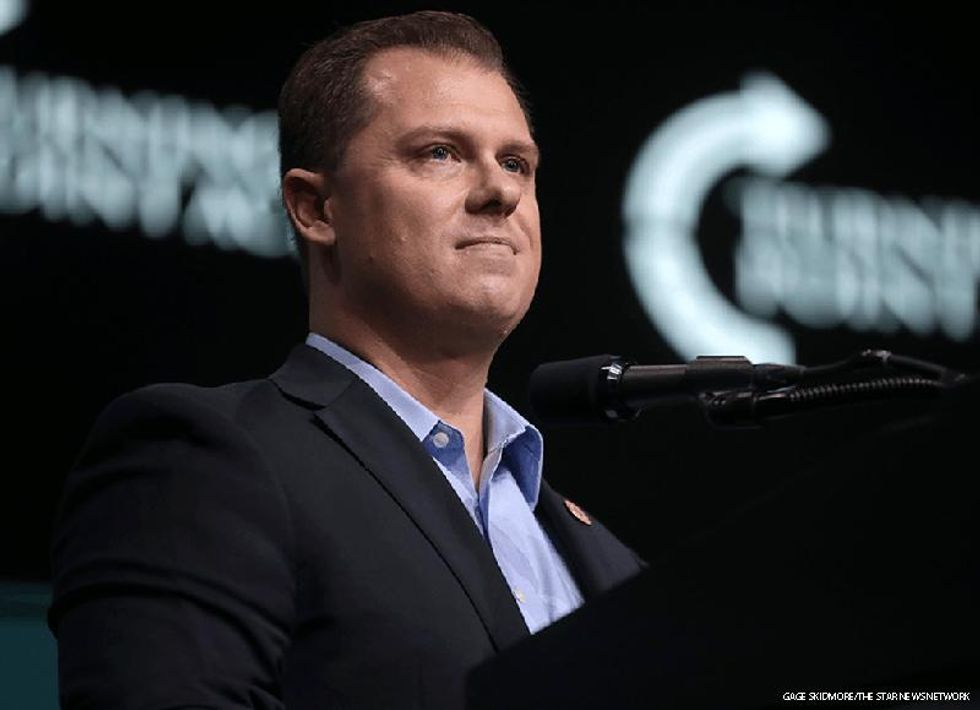
Arizona's House Bill 2495 would ban "sexually explicit materials" in K-12 schools, with exemptions for "classical" or early American literature. An early version of the bill singled out depictions of homosexuality, but Rep. Jake Hoffman, its chief sponsor, quietly removed that language before the House passed it in February. It's now pending in the Senate, and even the more general language certainly has implications for LGBTQ-inclusive content. The ultraconservative Hoffman has said the bill "is about nothing more than protecting the innocence of Arizona children from sexually explicit materials." Notably, it was just three years ago that Arizona repealed its "no promo homo" law regarding sex education.
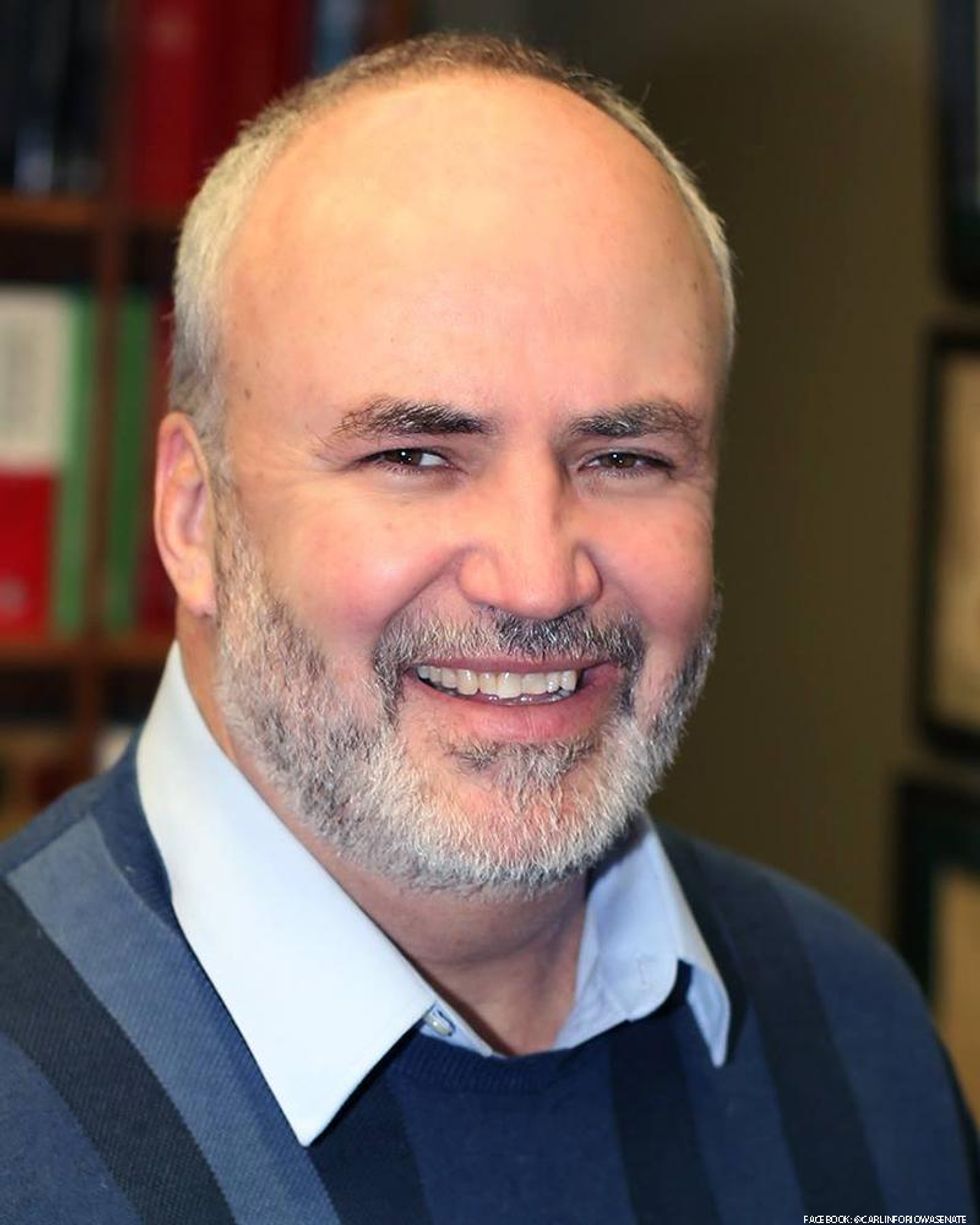
In Iowa, the far right is specifically targeting gender identity. State Sen. Jim Carlin's bill, Senate File 2024, would ban any instruction about gender identity in kindergarten and require parental consent for lessons on the topic in grades 1-6. "Confusing children with issues related to gender identity in their early formative years is not something that public schools should be engaging in," Carlin told The Iowa Torch in January. In the same interview, he said he'd received a complaint from a constituent about a transgender teacher's aide in her son's school. "I don't believe that the parents were notified about that, and I think they have a right as parents to know about things like that because when somebody is going to spend seven or eight hours a day with your child, you would want to know that," he said, even though his bill wouldn't regulate school staff's gender presentation. The legislation has so far only reached a Senate subcommittee, which voted to advance it. Carlin, who's also behind a so-called bathroom bill, may be using anti-trans sentiment as a stepping-stone to higher office. He's running in this year's Republican primary against U.S. Sen. Chuck Grassley, who's represented Iowa in D.C. for four decades. He's criticized Grassley for voting for President Biden's infrastructure bill and for accepting that Biden won the presidency.

New Jersey is a largely Democratic state where Republicans are nevertheless trying to keep students from learning about certain subjects. A bill from Sens. Joe Pennacchio and Michael Testa (pictured, from left) would amend state law so that students in grades K-8 would not receive diversity and inclusion training. "We want to prevent schools from teaching little kids about gender identities or deprogramming their 'unconscious racial and sexual biases,'" Pennacchio said in a press release. "Leave it to parents to decide how they want to approach these issues with their young children." The bill has been referred to a committee but has little chance of passing.

Conservative legislators in some states aren't proposing explicitly "don't say gay" bills but instead want to give parents broad powers to object to books and other educational materials they don't want their children seeing, potentially resulting in censorship of LGBTQ+ content or anything that deals with the history and effects of racism and sexism in the U.S. Many of these proposals are constructed as parents' bills of rights, and much of the language is similar from state to state, reflecting the role of national right-wing groups in creating the legislation. And in South Dakota, Gov. Kristi Noem has already signed a bill into law that says the state's public colleges and universities can't require students or staff "to attend or participate in any training or orientation that teaches, advocates, acts upon, or promotes divisive concepts."

In Kansas, House Bill 2662 is constructed as a parents' bill of rights, seeking to allow parents more information about what their children are being taught by requiring teachers to post detailed lesson plans and instructional materials online. This would include noting if a book contains sexual content, anything that would appeal to the "prurient interest," the latest version of the bill states. An earlier version listed depictions of homosexuality as "harmful to minors," but the latest one has more general language. It would also protect teachers from discipline for refusing to teach anything that conflicts with their "sincerely held religious beliefs" or that makes use of "critical pedagogy," a reference to critical race theory. CRT has emerged as a bogeyman of the far right, even if some who decry it can't explain what it is. It is used primarily in higher education as a way to evaluate the role of racism in history, but its opponents claim it's widely used in K-12 education and instills guilt feelings in white students. Rep. Kristey Williams is the driving force behind the bill, which has been approved by a House committee.
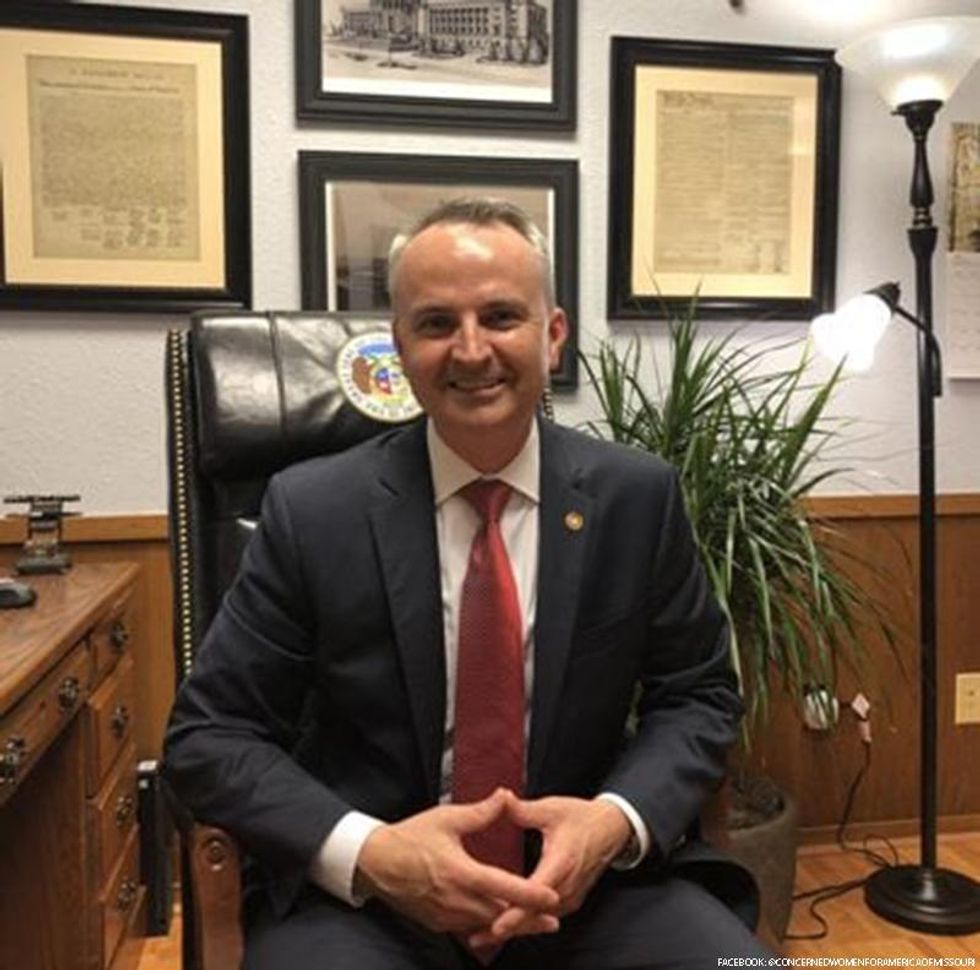
Rep. Doug Richey's so-called Parents' Bill of Rights would make school districts establish procedures for parents to object to instructional materials that violate their "beliefs related to morality, sexuality, religion, or other issues related to the well-being, education, and upbringing of such parent's minor child." It would also allow parents to take their children out of sex education classes. It takes aim at supposed lessons using critical race theory as well. "This is a bill that is responding to the fact that we do have public school districts supported by public tax dollars that are utilizing some of these concepts, and that needs to stop," Richey, who's a big proponent of charter schools, told the Missouri Independent. His bill has so far been OK'd by a House committee.
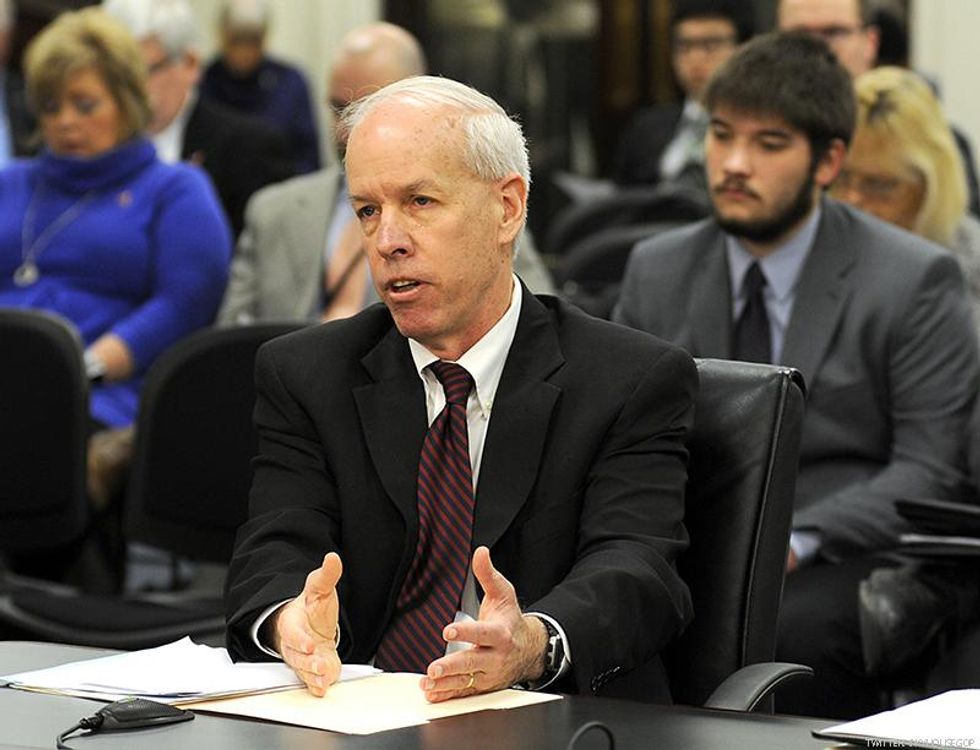
In Kentucky, some Republicans are convinced that public education is in a state of emergency -- not because of insufficient funds or other typical woes, but because students are being taught that racism exists. "It is imperative that the racist indoctrination of children in Kentucky schools be eradicated," says House Bill 14. The bill also seeks to assure that no student at a public college or university is required to "engage in any form of mandatory gender or sexual diversity training or counseling." The chief sponsor is Rep. Joseph Fischer, who's a big opponent of abortion rights as well, and is running for a seat on the state Supreme Court. Kentucky is nearing the end of its legislative session for the year and the bill hasn't gone past a committee, so maybe others don't see such an emergency.
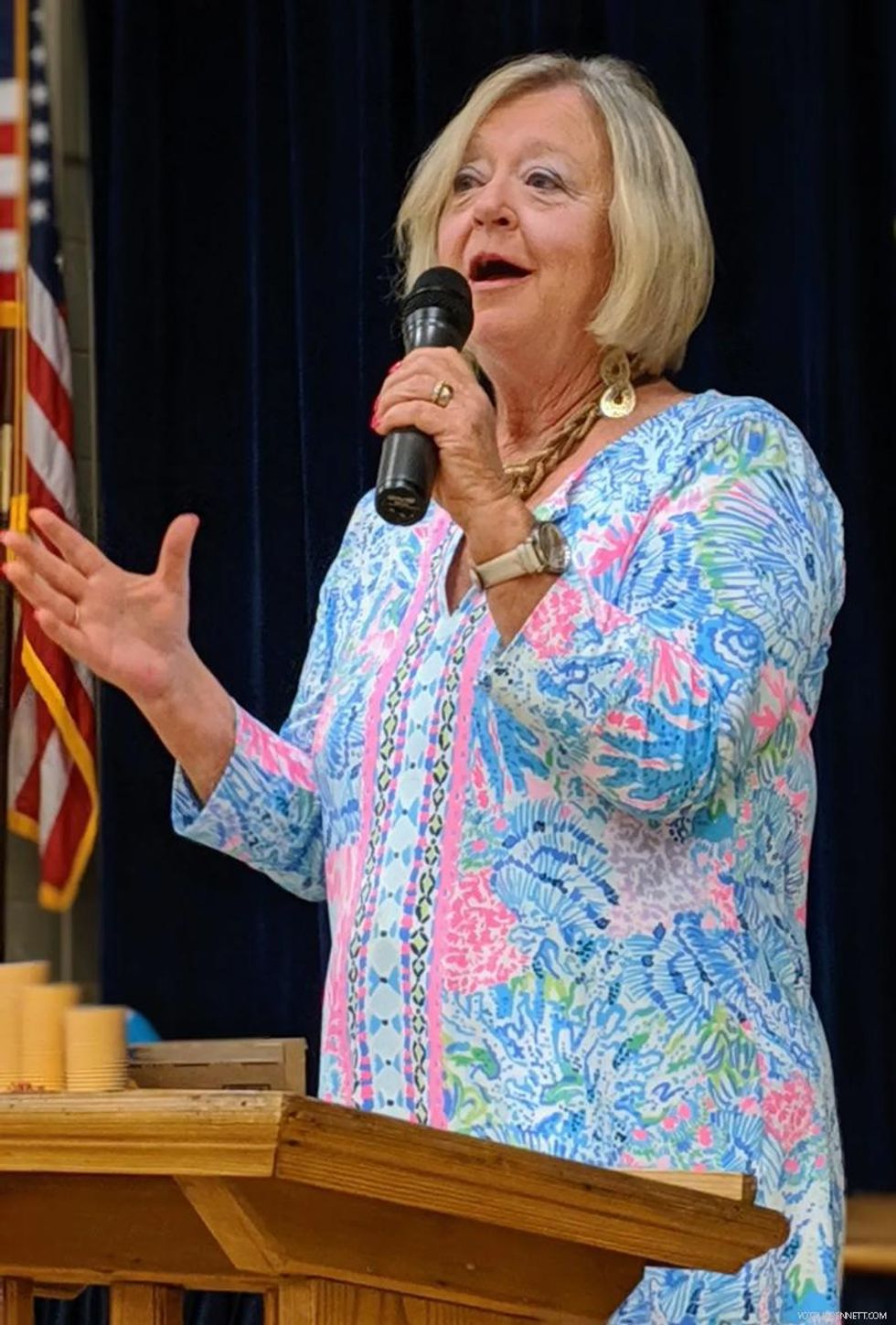
South Carolina's version of a parent's bill of rights likewise calls for school districts to set up procedures for a parent to object to instructional materials. "Such objections may be based on beliefs regarding morality, sex, and religion or the belief that such materials are harmful," the legislation notes. Its sponsors include Rep. Linda Bennett, who's also backing a trans-exclusionary sports bill as well as pro-gun and anti-abortion measures. The "bill of rights" has been referred to a committee.

Rep. Adam Niemerg's House Bill 5505 is another one claiming to be for parental rights. Like similar bills in other states, it calls for procedures for parents to object to any aspect of the curriculum, and it specifically notes teachings on race and sex, alleging that individuals of certain races and genders are being made to feel responsible for the past misdeeds of others. It doesn't mention sexual orientation or gender identity, but it's no stretch to imagine that parents would object to mention of those topics. It further seeks to assure that schools "are not adopting curriculum that fosters hate and division among current students, or which encourages students to hate or despise their nation." It's been referred to a committee but hasn't advanced beyond that, and it isn't likely to do so in Democratic-dominated Illinois.

Rep. Patricia Morgan is behind a "parents' rights" bill that echoes those in several other states, in seeking to set up procedures for parents to object to school curricula and materials. "Such objections may be based on beliefs regarding morality, sex, and religion or the belief that such materials are harmful," the bill states. A committee has recommended that it be held for further study, so it's not likely to advance in the deep-blue Ocean State.

South Dakota's House Bill 1012, proposed and now signed into law by Gov. Kristi Noem, doesn't mention sexual orientation or gender identity, but the implication is there. Under the legislation, the state's public colleges and universities can't require students or staff "to attend or participate in any training or orientation that teaches, advocates, acts upon, or promotes divisive concepts." It's also aimed at anything involving critical race theory, although that term doesn't appear in the measure either. The Human Rights Campaign has termed it a "curriculum censorship bill."